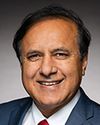Thank you so much, Madam Chair.
Thank you, Madam Chair.
I'd like to now turn to address the issue of application inventories and processing times at IRCC.
My view, I think people will appreciate, is that immigration is critical to the well-being of our communities, and that newcomers play an essential role in addressing some of our most severe labour shortages throughout the pandemic and as we enter the economic recovery phase.
The past few years have posed real challenges that would have been beyond imagining just a couple of years ago. Immigration systems around the world have been affected by the pandemic as a result of lengthy border closures, travel restrictions and public health measures that have prevented people from going to work, particularly in jurisdictions where they may not have been able to adjust to work from home as easily as they have in Canada, depending on the line of work.
Yet at the same time we continued to receive applications, leading to frustrating delays and substantial file backlogs. My department is working hard to resolve these issues.
We have made great efforts to mitigate the effects of the pandemic, partly through digital solutions and program innovations.
Immigration, Refugees and Citizenship Canada has modernized its processes by increasing the digitization of files, offering online intake for many lines of business and allowing for greater remote processing of applications despite office closures that forced staff to work remotely where that was an option.
As a result, and in spite of the global pandemic, IRCC made over half a million decisions and welcomed over 405,000 new permanent residents in 2021, which is the greatest number of newcomers in a single year in Canada's history.
This was possible in part because we established a pathway to permanent residency for people who were here in Canada on a temporary status, including temporary foreign workers, students and others making a positive contribution to Canada’s economy.
Additionally, in the midst of the pandemic, we made a decision to step up with a significant contribution on the world stage to accept at least 40,000 Afghan refugees as well as tens of thousands of Ukrainians.
In spite of this increasingly large and complex workload, we are seeing that we are able to reach some pretty important goals. Already IRCC has surpassed its goal to make 147,000 permanent residence final decisions in the first quarter of 2022, which is double the number during the same period of time in 2021. In fact, from January to the end of March, we made over 156,000 final decisions on permanent residence applications, which puts us on a pace where our ambitious goal this year is well within reach.
To respond to the pressures resulting from the pandemic, to support Canada's economic recovery and to help us address our labour shortage, we're investing an additional $85 million to help reduce application inventories that were accumulated during the pandemic and to increase staff across the department.
This includes applications from international students, workers and visitors, as well as applications for permanent resident card renewals and citizenship ceremonies.
On April 22, I announced that, at the beginning of mid-June, Canada will extend post-graduate work permits for recent international graduates. Those whose permits have already expired or will expire this year will be eligible for an additional open work permit of 18 months. As well, in July of this year, we'll be ending the temporary pause on express-entry draws, and we will resume inviting qualified candidates to apply for permanent residence.
Across Canada, processing is going to continue for all of our programs with 100% of IRCC offices and service providers open. Capacity limits continue to require the majority of staff to work remotely, but it's not stopping processing or our ability to address the inventory of cases that have built up.
Of our missions overseas, 98% are open. As well, 97% of our visa application centres are open and offering biometrics collection, and 98% of our panel physicians' clinics are open and offering immigration medical exams.
But clearly, there is a lot more work to do. Addressing a backlog of applications is not simply a numbers or a resources challenge—it is a human challenge.
Every application represents a person whose life is in some way on hold or has been impacted. I know that. Our department is also very aware of the real-life impact that the challenges that our immigration system faces can have on individuals and families.
My view is that we have a duty to resolve these challenges, to do right by those who have hopes of making a new life in Canada and to help to continue to recover from the pandemic. We're committed to helping to resolve these challenges by making the necessary investments to address these challenges that are serious, but are the result of a temporary and exogenous shock to the immigration system.
Thank you for your time.
With that, I'll be pleased to answer the committee's questions with the final comment that we shouldn't lose sight of the fact that the output of our immigration system remains extraordinary.
The user experience can be very challenging. By making the kinds of investments that I've described and some that I'm sure we'll get into in the question and answer period, I do believe we can return to prepandemic standards and have our immigration system on track to support the people who'd like to come to Canada, and as importantly, support the communities that they will call home after they arrive.
Thank you, Madam Chair.










